October 1916. The German submarine calls at the base in Newport. Its commander, Captain Hans Rose, pays a courtesy visit to the American admiral. Then he hosts a delegation of US Navy officers on board. And then ... it starts to melt ships right under the barrels of American destroyers.
In the second half of July 1916, the German submarine "Deutschland" reached the port of Baltimore, in the still neutral United States. It was a new type of vessel, specially designed to transport valuable strategic resources. Its use for this purpose was necessary due to the Allied naval blockade. The U-Boat was greeted with enthusiasm by local Germans. During the trip to Washington, German seamen were even hosted by Franklin Delano Roosevelt, then the Minister of Shipping.
Break lock
At the end of August, Deutschland broke through the Allied blockade and returned safely to Germany, laden with rubber, nickel, tin and jute. His voyage was widely echoed around the world, arousing fury and consternation, especially in Great Britain.
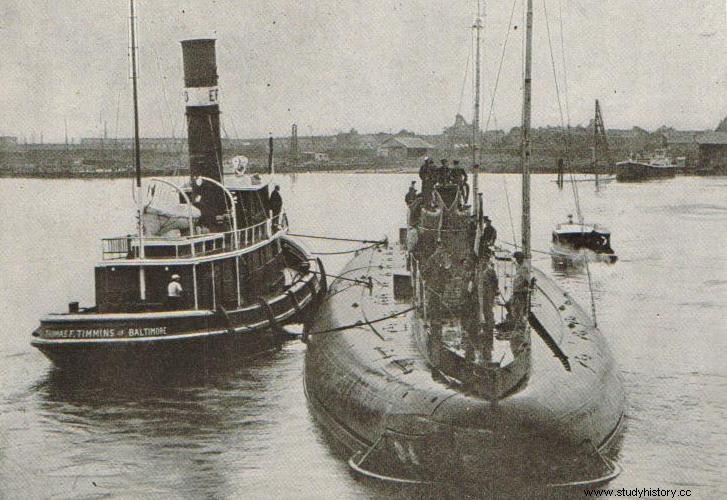
Submarine "Deutschland". Photo taken during his stay in the American port of New London (source:public domain).
Encouraged by this success, the Germans decided to follow the blow and send another U-boat transport across the ocean - the "Bremen". It was to be covered by a modern long-range U-53 submarine, commanded by Cpt. Hans Rose.
Rose was given additional tasks. His ship was to enter an American port and then fight enemy shipping off the coast of the United States. Apart from the military, it was to be an equally propaganda campaign. It was about showing the world the power of U-Bootwaffe and German technical thought.
Bremen never made it to the American port. Probably bumped into a mine near the Orkney Islands. Hans Rose's ship had to continue its voyage alone.
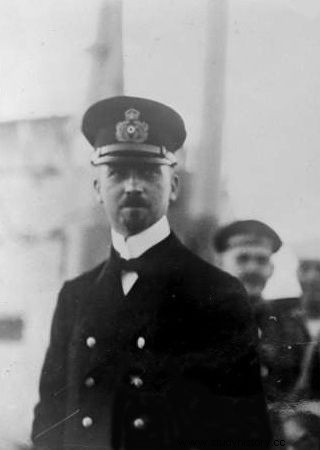
Hans Rose himself (source:public domain).
Pop out for a newspaper for a while
On October 7, 1916 at 15.00 U-53 moored in Newport. The appearance of the German submarine caused a lot of sensation among the local residents and base personnel. Rose, wearing a gala uniform, went to honor Admiral Knight, commander of the Newport-based destroyer flotilla.
Then, as Robert K. Massie wrote in the third volume of his book "Steel Fortresses", the German commander: sent a letter to the German ambassador and bought a local newspaper listing the ships that were to depart and their destination ports .
Soon on board the U-boat came with a return visit by adm. Knight. He was accompanied by his officers and wives, representatives of the local press, and invited Newport residents. Despite the generally friendly atmosphere, the Americans were wary of the Germans and tried to stop the ship under the guise of a sanitary inspection.
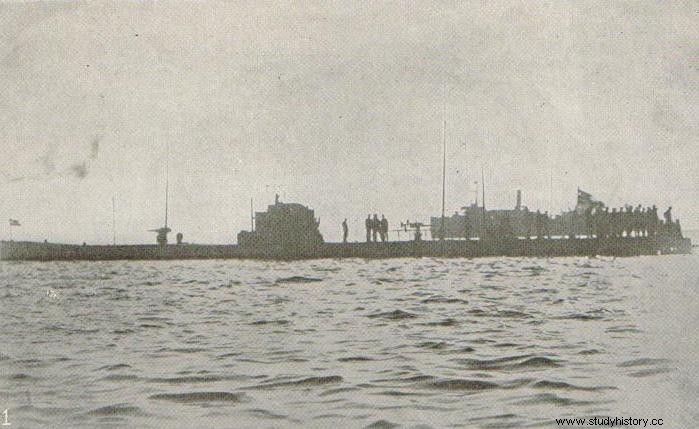
U-53 photo taken while he was in Newport (source:public domain).
The attitude of the Americans is not surprising:they had fresh memories of the tragedy of the U-20 torpedo liner "Lusitania". American citizens were also on board, among the numerous casualties. This catastrophe led to a significant cooling of diplomatic relations between the US and Imperial Germany.
Hell in Paradise
For this reason, although international law allowed him to stay in a neutral port for 24 hours, Rose ordered to unberth at 17.30. U-53 went to sea in the falling darkness. As it soon turned out, the information in the newspaper was of great use to the German commander.
On October 8, dawn found U-53 crouching next to the Nantucket lighthouse. Soon, near the calm and safe shores of the United States, there was a real slaughter of transporters. As the first one, at approx. At 7.00 am, the American ship "Kansas" was detained. After the search and declaration of nationality, he was set free.
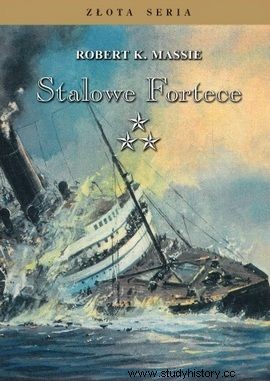
However, another seven transporters were not so lucky:five British and one Dutch and one Norwegian went to the bottom. At this point, however, it must be honestly said that Cpt. Rose operated strictly according to the rules of international maritime law. Before torpedoing, German submarines made it possible for their crew members to evacuate in lifeboats. Thus, none of the sailors died.
Move over Pan!
All of this happened in the presence of as many as 16 alerted US Navy destroyers! As the already mentioned Robert K. Massie emphasized:
At one point the U-53 got so close to the American ship that it had to stop its engines to avoid a collision. On the same day, another destroyer standing close to the abandoned Dutch ship was asked by Rose to change position so that he could freely torpedo the ship. The destroyer obediently moved and U-53 launched 2 torpedoes, sending the freighter to the bottom.
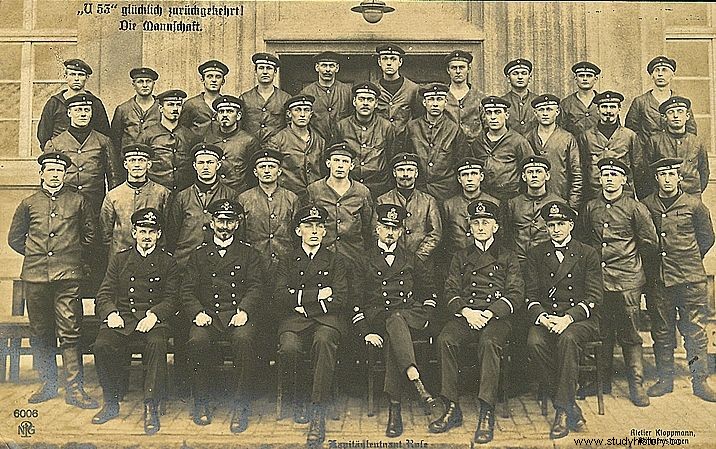
U-53 crew included. Cpt. Hans Rose (source:public domain).
Record patrol
Finally, Capt. Rose was forced to end her mission. The torpedoes have run out on the German ship. On October 28, U-53 docked at the Helgoland base, probably unaware of the storm that had unleashed in the world in connection with his actions. The British were furious that the American ships had done nothing to prevent their ships from sinking. The House of Commons was furious.
The US State Department had to explain itself for the passivity of its Navy at a specially convened press conference. The truth was, however, that as long as U-53 was outside US territorial waters, US Navy destroyers could not intervene. Which did not change the fact that the German mocked the Americans.
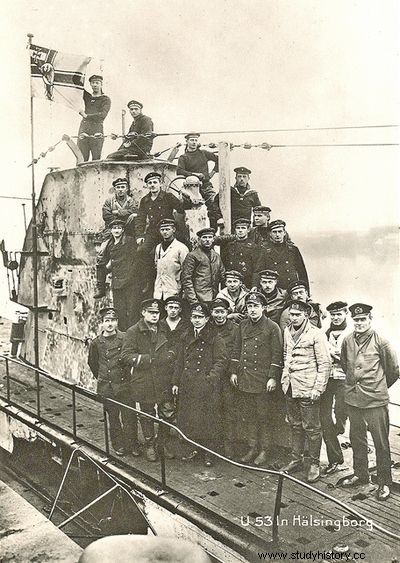
One more photo of the U-53 crew (source:public domain).
The U-53 patrol has gone down in history for one more reason. It was the submarine's first ocean-going combat voyage. The U-Boat traveled a total of 7,550 nautical miles without refueling. He spent 41 days and 8 hours at sea, of which only 2.5 hours was in the port. The U-boats had become a lethal weapon, and more than once during this war were to prove it.
You can buy the book at Empik stores:

